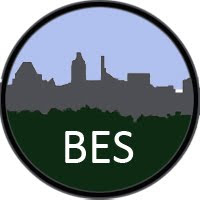This research was supported by funding from the NSF Long-term Ecological Research (LTER) Program. This material is based upon work supported by the National Science Foundation under Grant Nos. DEB-1637661 and DEB-1855277. Any opinions, findings, and conclusions or recommendations expressed in this material are those of the author(s) and do not necessarily reflect the views of the National Science Foundation.
The Baltimore Ecosystem Study has been a National Science Foundation Long Term Ecological Research (LTER) site since 1998. Visit other LTER sites.
 |
 |

Baltimore Ecosystem Study partners with Baltimore City Public Schools
$1.2 million NSF award will integrate local data into chemistry curriculum Through a $1.2 million grant from the National Science Foundation, the Baltimore Ecosystem Study (BES) is partnering with Baltimore […]
Bug Hunt
What’s the link between poverty, disinvestment, and mosquitoes? Every July, for four years running, Shannon LaDeau inspected nine ceramic toilets sitting idly in a vacant lot behind a building, near […]
Seeking Nuance in the Human Ecosystem: Built Versus Constructed
Parts of Any Human Ecosystem There are four components of human ecosystems: biological, physical, social, and built. They are all necessary categories for human ecosystems, by definition. The one-word label […]
A mobile app and the story of Urban Diatoms
Why and How the Baltimore Ecosystem Study uses iNaturalist iNaturalist is an online biodiversity information platform and app. It connects scientists, citizens, and naturalists in sharing observations and occurrences of species […]
Diversity and Synthesis
Dear BES Community, The April Quarterly meeting was a dynamic, interactive day. We were happy to see new faces from graduate students to visiting scientists and hear their voices in […]
The MetaCity: Baltimore’s Transportable Idea in Thailand
I hope I will be forgiven for calling the MetaCity a Baltimore idea, at least in part. Architect and leader of the BES Urban Design Working Group, Brian McGrath is […]
Asphalt: Evolving Urban Boundary Object
Asphalt. What could be more pedestrian, literally underfoot? Or ignored as a dull gray ribbon somewhere beneath the floorboards as one navigates along city streets, concentrating on one’s destination? Or […]
Renewal and Diversity
Dear BES Community, As we begin 2017, we are grateful for the opportunity to clarify our research outlook. We are hard at work developing a new conceptual model, research questions, […]
BES Annual Report 2017: Part 3 – Key Activities for the Year
Major Activities. There are a large number of contributors to BES, including senior scientists, post-doctoral researchers, undergraduates, and even high school students. Their activities are presented below, divided into the […]
BES Annual Report 2017: Part 2 – What Is Our Theoretical Foundation?
A Role for Theory The goals of BES are supported by three major kinds of theories. Theories are unifying frameworks that embrace many models and identify the fundamental postulates and […]